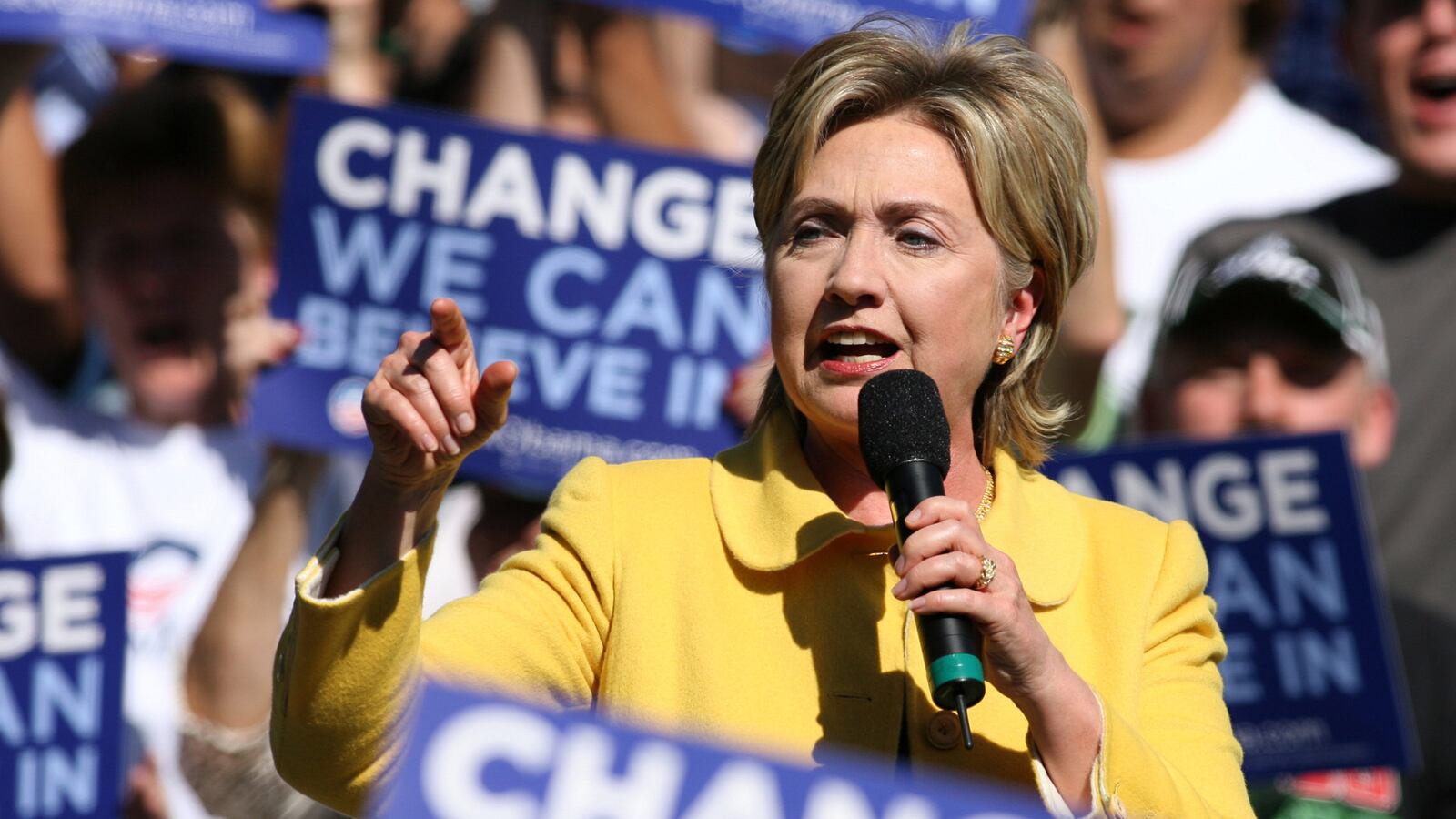What if they threw a primary and no one came? With the consensus that has emerged around Hillary Clinton in 2016, it’s the question that has pundits terrified—and it explains the most recent manufactured controversy to capture the nation’s columnists.
To be sure, the idea of Clinton gliding to the Democratic nomination without as much as a scuffle would be so unprecedented that it is likely a fantasy. Even Dwight D. Eisenhower had to battle for the Republican nod in 1952—and he had conquered Normandy, not just Foggy Bottom. But two years before the primaries, there is hardly a rival on the horizon, her super PAC-in-waiting is raking in dollars hawking “uber soft 100% cotton Hillary hoodies” for holiday delivery, and 89 percent of the same Iowa voters who gave her a third-place finish in 2008 now have a favorable impression of her.
The recent spat among Washington’s Democratic insiders has flared against the backdrop of this emerging Clinton consensus. The squabble began with liberal columnists attempting to position Sen. Elizabeth Warren (D-MA) as a populist alternative to a pro-corporate Clinton in 2016. Democratic-oriented think tanks jumped into the fray with dueling Op-Eds over whether such a populist appeal makes political sense. Some even called the populist rift a Democratic “civil war,” but “silly” is a more apt description.
That’s because both sides of this skirmish accept as an unquestioned presumption the notion that Hillary Clinton—and Bill Clinton—are not economic populists. The facts show otherwise. Indeed, a strain of the best type of populist appeal runs directly through their respective political careers. “For more than a decade this country has been rigged in favor of the rich and special interests,” read “Putting People First,” Bill Clinton’s 1992 campaign plan, which called for higher taxes on the rich and “eliminating deductions for outrageous executive pay.” In a speech at the University of Pennsylvania’s Wharton School as a candidate, Clinton attacked the institution as “a powerful symbol of where our country went wrong in the 1980s,” calling out Michael Milken and Donald Trump by name. Twenty years before Occupy Wall Street, he told the aspiring Wharton MBAs that “one percent of the people in the ’80s got 60 percent of the country’s growth. America is evolving a new social order, more unequal, more divided, more impenetrable to those who seek to get ahead. And although America’s rich got richer in the 1980s, the country did not.”
Fast-forward 16 years later, and it was Hillary Clinton who was being attacked in Wall Street Journal Op-Ed for her “class warfare” populism. It was a fair description of the candidate who surged on her appeal to lunch-bucket, blue-collar, “beer track” voters during the endless primary season against Obama. “With all due respect, America was not made great by rich people,” she said at a campaign stop in Sioux City in 2008. “It was people who worked hard every day who made America great.” She laid out the dividing lines in clear terms: “We’ll take on Wall Street and tell them: ‘You’re going to finally pay your fair share in taxes, because it’s outrageous that a teacher making $50,000 pays a higher tax rate than some Wall Street investment managers making $50 million.’”
It was not just rhetoric. At Democracy: A Journal of Ideas, we tried to convince both Senators Clinton and Obama to embrace the idea of a Financial Product Safety Commission, which a little-known Harvard Law professor had recently published in our pages. Wall Street hated it, but Clinton put it at the heart of her “Fair Credit for Families Agenda.” The idea eventually was rebranded as the Consumer Financial Protection Bureau. And the law professor? Elizabeth Warren.
Without a doubt, President Obama deserves enormous credit for adopting the idea, putting it into his financial system reform legislation, and fighting against an unprecedented onslaught of Wall Street cash to pass it into law. But Clinton’s history should disprove any assertion that she is some sort of crypto-corporatist.
The truth is, the Clintons have brought a special brand of populism to the political debate that is occasionally at odds with the preferences of those more interested in scoring political points than making appreciable progress. Theirs has been a “values-oriented populism” that sees America divided not by rich vs. poor but by those doing right vs. those who doing wrong.
And it is a “problem-solving populism” that marries the twin impulses of populism and progressivism. Where populists point out how things have gone off course, progressives channel anger into action. Combining both impulses was how Bill Clinton not only won a 1992 election that fundamentally rejiggered the electoral landscape but helped bring about a rise in median wages for American workers.
The Clintons’ populism is less likely to have an enemies list than a laundry list of ideas. That might leave some liberal ideologues cold, but it is a populism that produces results. Isn’t that what ultimately matters most?





